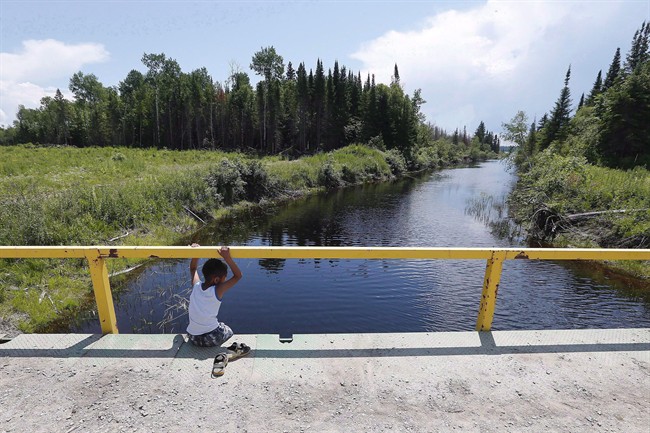SHOAL LAKE, Man. – The chief of an isolated reserve under one of Canada’s longest boil-water advisories says construction on a road linking his community to the outside world must begin now.

Shoal Lake 40 First Nation land straddles the Ontario-Manitoba boundary and was cut off from the mainland a century ago when an aqueduct was built to supply fresh water to Winnipeg. The reserve has no all-weather road and has been under a boil-water advisory for 18 years.
READ MORE: Prime minister hauls water at Shoal Lake 40 First Nation for documentary
Chief Erwin Redsky says the First Nation’s only aging ferry broke down three weeks ago, cutting off the community entirely.
This time, it was the ferry’s engine. In May 2015, the ferry failed to pass a federal inspection and was taken out of service, which prompted the reserve to declare a state of emergency and fly out its elders.
The ferry resumed operation on Wednesday, but the most recent breakdown underlined the vulnerability of the reserve and the need to get an all-weather road built, Redsky said.
“The ferry is not too reliable. Hopefully it will hang in there,” he said in an interview.
“We want to do something fast. We want to do it as soon as we can while the weather is in our favour.”
- Life in the forest: How Stanley Park’s longest resident survived a changing landscape
- ‘Love at first sight’: Snow leopard at Toronto Zoo pregnant for 1st time
- Buzz kill? Gen Z less interested in coffee than older Canadians, survey shows
- Carbon rebate labelling in bank deposits fuelling confusion, minister says
People who live on the reserve use a treacherous ice road in the winter and people have died falling through the ice.
In the summer, the reserve’s ferry runs up to 18 hours a day.
Health-care workers and ambulances won’t risk going to the community and children have to leave the reserve to continue their education past Grade 8. A water treatment plant is prohibitively expensive, as are housing and sewer upgrades, without a road to transport the necessary equipment.
Ottawa, Manitoba’s former NDP government and the City of Winnipeg all promised last December to split the cost of building what residents have dubbed Freedom Road. At the time, the project was expected to cost about $30 million, based on an old estimate.
Construction costs have since been reassessed at about $45 million.
Prime Minister Justin Trudeau, who called the reserve’s lack of road inexcusable during the federal election campaign a year ago, has reiterated his government’s commitment to construction despite the increased cost.
Manitoba’s new Conservative Premier Brian Pallister has said he’s committed to the project as well, but provincial funding is still being reviewed. No one from the government was immediately available for comment.
Redsky said he’s in talks with the federal government to move ahead with construction on reserve land this winter while waiting for the province to follow through on its commitment.
Two-thirds of the road is on provincial Crown land but the other one-third is on the reserve and under the jurisdiction of the First Nation and the federal government.
“Why can’t we do the federal portion right away while we’re waiting?” Redsky said. “We’re ready to go. The federal commitment’s there. The federal dollars are in place. Let’s get ‘er going.”
A spokesperson for federal Indigenous Affairs Minister Carolyn Bennett did not immediately respond to a request for comment.

Comments